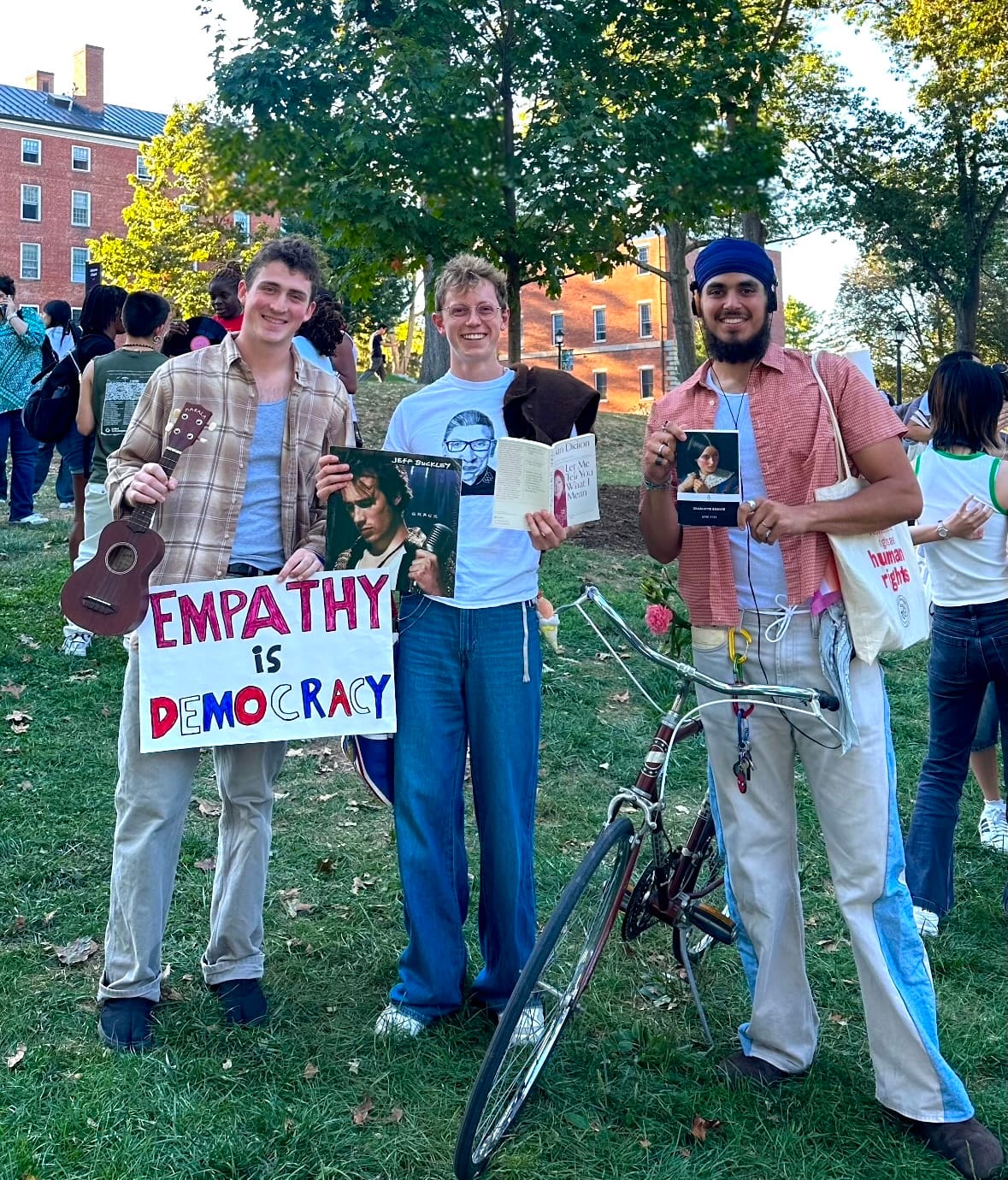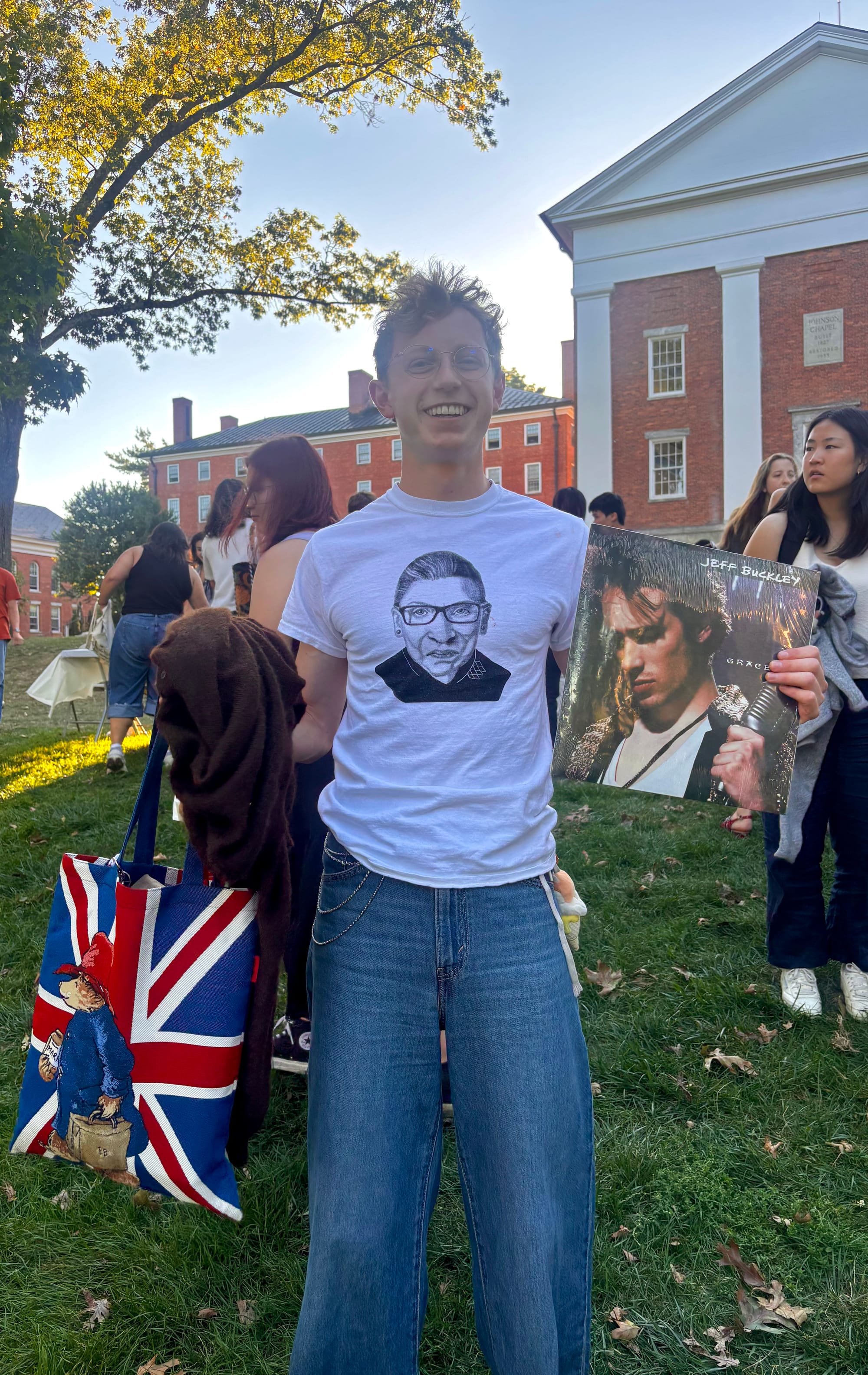Lessons From The Performative Male Contest
Last Friday, Clairo, matcha, and feminist literature took the spotlight at Amherst’s first Performative Male Contest, hosted by AAS. Contributing Writer Luke Deeble ’29 reflects on satire and stereotypes as contestants embodied a popular culture archetype to the fullest.

The narrowly defined “performative male” is something of a rare specimen. Few who attended Friday’s Performative Male Contest, as spectator or participant, seemed able to cite a person they had met in the wild who was truly emblematic of the stereotype.
But, outside of the recent ultra-specific “performative male” trend sweeping the country, to refer to a “man who performs” is to be borderline redundant. It is to all performers, then, that I redirect winner Tim Churchill ’29’s sage advice: “Don’t take yourself too seriously.”

Churchill’s advice could easily be described as the ethos for Friday’s contest, which was a great deal of fun (although a bit long, and certainly detrimental to the school’s stockpile of tampons). This came as a pleasant surprise, given that I had prepared for the story by reading a great number of unfun essays on the subject. Writers at Elle, Cosmopolitan, British GQ, etc., insist on taking the phenomenon seriously — evidently, a sect of men curating their interests to those more likely to be shared by women is not merely annoying and superficial but also manipulative and malicious. Are men doing things solely to attract women? “This wouldn’t be the first time,” a HuffPost sleuth shrewdly notes, “that men put on a facade to get sex.” (This writer — Syeda Khaula Saad — actually decries the disenfranchisement of performative men as “counterproductive” — even that, though, is taking the trend too seriously).
Amherst’s contest was not the sardonic spectacle these commentators led me to expect. Everything was clearly in good fun, and Contestants seemed more driven by the “meme” of it than by actual personal experience — a good thing, as real anger or annoyance can easily overwhelm humor.
The format was simple: A contestant walked out, explained their fit, their books, and their vinyl albums, usually with some gimmick up their sleeve. Then they were asked a question, sometimes to name the author of the book they are holding, sometimes how to solve crises in foreign countries. There were almost as many contestants as spectators, it seems, and most even had something novel and funny to say. The winners were determined after some deliberation by the judges — it is unclear whether or not the male judges, who were evicted from the table late in the contest on the charge of preventing female judges from speaking (as a male judge explained at great length), were involved in the ultimate decision.

If there is one thing the contestants are aiming for, it is less “performative men” and more of that overwhelmingly self-righteous presentation of liberal we are all familiar with. We are called into session with a satirical 90-second moment of silence for menstruating people. This strikes me as aptly lampooning the tone-death virtue signaling we got an epidemic of in the years following 2020 — we are mourning, it would seem, an almost unbelievable tragedy, in that some people have to actually be women. A contestant, much later, read feminist literature in silence while the emcee read a statement explaining that this individual continues that moment of silence and will do so indefinitely. Shortly after, another contestant expressed his disgust that we have gotten this far into the contest “without a land acknowledgment.” Of course, the beauty of the forum is that it is a means of liberal self-reflection almost unintelligible to anyone who isn’t themselves liberal (that is, it cannot really be co-opted or jumped upon by non-liberals). Would this sort of event have been socially acceptable even a few years ago, when liberal beliefs were held with such pride that few seemed willing to acknowledge that some might be insincere and self-serving? Of course, (almost) everyone performing and in the crowd agrees literally with the very pronouncements they laugh at. But we have developed the ever-important ability to “not take [ourselves] too seriously.”
It occurred to me as I watched the event that the performative male stereotype is not merely a reaction to contemporary female interests, but a fusion of traditional (effective) male strategies for attracting the female gaze with appeals to new phenomena and norms. For example, one contestant forwent any explanation of his outfit to play “Can’t Take My Eyes Off of You” by Frankie Valli, not even alluding to that song’s role in “10 Things I Hate About You” (dir. Gil Junger). Patrick (Heath Ledger), who is shown with feminist literature and conjures an interest in a girl group that Kat (Julia Stiles) likes, is a proto-performative male. Of course, there is nothing novel about a man playing guitar in an attempt to impress women. From this, I derive that the contest is a complex and, in our case, consistently apt satire of our messy dating landscape at large and culture generally. Some of the most fun moments came when contesting personas attempted to slyly couch awkward proposals for interactions with women between displays of righteousness: “[Find me] if you need a ride to the democracy protest,” “I’m a safe space!” “I was just going to play guitar on the lawn after this anyway, so if you are a woman, feel free to join me and maybe we could get like dinner afterwards.” From our deserving winner, Tim: “I’m just going to keep this [a tampon] on me. And if you’re menstruating, just shoot me a text.” Our second-place performative male, Jeevan Khanuja ’28, brought his bike to the contest, advocating for sustainable transportation while incessantly professing his love for his “abuela.” Parker Smith ’27, our third-place winner, came to the judging table holding an “empathy is democracy” sign upside down, and even sang “Bésame Mucho” by Los Panchos on his ukulele.
The performative male contest is not only a meta-performance but an actual performance, and while I have no reason to cast doubt on the motives of any particular contestants, I cannot ignore the irony of the near statistical certainty, given the sheer number of male contestants involved, that at least one explicitly entered a contest satirizing men who organize their lives around impressing girls, to impress girls. But whether driven by lust or love of the game (or love of the first-place prize, Jeff Buckley vinyl — although, disappointingly, winner Churchill admitted to having no idea who Buckley was), I was impressed by Amherst’s performative male talent, and so seemed the crowd of at least 70 people that came and went, as well as more than 30 contestants. The best acts slipped seamlessly between meta-performance and actual performance, and understood with the precision of an acupuncturist the points of our endlessly complex and somewhat volatile culture that could be expertly exploited to engender warm crowd laughter. We have among us, Amherst, Picassos of a strange new art, Houdinis of cultural entrappings.
I hope the performative male contest does not fade completely as fads do, but evolves into a sort of pseudo-pageant tradition that adapts to whatever cultural moments lie before us. I think it could be a valuable tool for self-reflection going forward. I, for one, honestly look at the cultural moment just a bit differently than I did before. But, most importantly, it’s a great deal of fun.





Comments ()